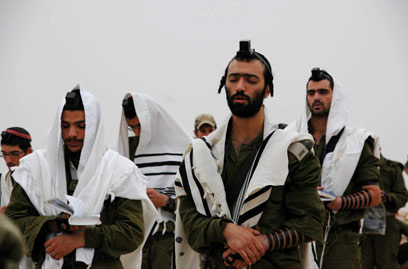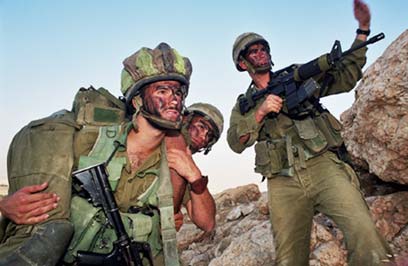
Soldiers of Nahal Haredi
צילום: פליקס פריש
Nahal Haredi commemorates its fallen
Thirteen of original Nahal Haredi's fallen to be honored by Netzah Yehuda Battalion for first time since unit dispersed in '70s
As Israel honors its fallen this Memorial Day families gather at cemeteries to remember their loved ones. The cemetery plots are groomed to perfection and soldiers' names are praised.
But there are 13 such fallen soldiers who do not receive this honor – members of the first Nahal Haredi. Their families choose to forget their contribution to the state and even their successors, who continue on the winding path of negotiation between faith and the military, have never appeared at their gravesites.
- Ynetnews invites you to share stories of the fallen here
Last year Ynet revealed that these fallen soldiers of a unit that existed from the early '50s to the beginning of the '70s have been largely forgotten by the state and its citizens.
But after this revelation came change. This year the 13 soldiers are being commemorated with a ceremony held by the new Nahal Haredi, the Netzah Yehuda Battalion, whose troops will stand by their grave plots during the siren marking two minutes of silence.

Nahal Haredi soldiers pray (Photo: IDF Spokesperson)
'Mourning ties haredim to army'
Staff-Sergeant Naftali Levinger will stand at the grave of the fallen Yehuda Haviv Naimi. Levinger is an alumnus of Tiferet Zvi yeshiva. After three years of intensive studies he decided to enlist in the IDF.
"Before I enlisted I wasn't very conscious of the whole issue of ceremonies," he explains. "At the yeshiva we used to read out Tehilim during the siren, and it was the only mention of this day. Only after I enlisted did I understand that this is a national day of mourning for all of Israel, and mourning – whether they like it or not – connects haredim to the army as well."
Levinger says he feels a special bond with the 13 fallen ultra-Orthodox soldiers. "We have only recently learned their stories. We knew there were different Nahal units but we didn’t know there was also a haredi unit, and that we are not the first to walk down this path. Today they are our heroes, and we are their successors," he says.
The soldier adds that he will not hesitate to stand during the moment of silence for Israel's fallen, even if he happens to be standing among other haredim.
"Today there is a very big change in the ultra-Orthodox public regarding enlistment. All of the new courses opening up in the IDF testify to a great change. Today's haredim are more connected to the Israeli public and recognize the tradition of official ceremonies," he explains.
"Once, residents of Meah Shearim used to throw stones at anyone who stands during the siren. Today there are those who hang up flags. I believe and hope that this attitude will increase over time."
Levinger adds that his yeshiva colleagues were accepting of his decision to enlist. "My generation is getting more and more involved in this, so I'm not exactly an aberration among my friends," he says.
But the young soldier feared his parents' response. "I was surprised. They took it really well. They even encouraged me and supported my decision to serve the country," he says.

During training (Photo: IDF Spokesperson's Unit)
Desire to take part in ceremonies
The ultra-Orthodox ceremony will differ from other Memorial Day ceremonies taking place throughout Israel Monday. "As a haredi many times I had to discreetly leave a military ceremony because there was something there that went against my faith," he explains, recounting in particular his commanders' course graduation ceremony.
"A band of girls sang at the ceremony while we haredim were in the crowd. We couldn't leave, of course, but we tried to hide in the back," he says. "Needless to say it was very uncomfortable for us."
But Levinger hopes members of his faith will be able to take part in official rites. "I predict that in the future haredim will want more and more to participate in these ceremonies," he says.
Yeshayahu Shoshan, a platoon commander in the current Nahal Haredi, the Netzah Yehuda Battalion, says the ceremony held by the unit will indeed differ from others held by the IDF Monday. But in his hometown of Beitar Elite, he says, ceremonies will not likely take place.
Shoshan will be standing by the grave of Private Avitzedek Rakovsky at the Mount of Olives cemetery in Jerusalem. "He is an alumnus of Hebron yeshiva," Shoshan says.
"For me it is important to know that there were people like that – haredim who combined successfully the military with an ultra-Orthodox lifestyle. I don’t think his service harmed his spirituality in any way. I think, maybe, even the opposite is true."
- Follow Ynetnews on Facebook










